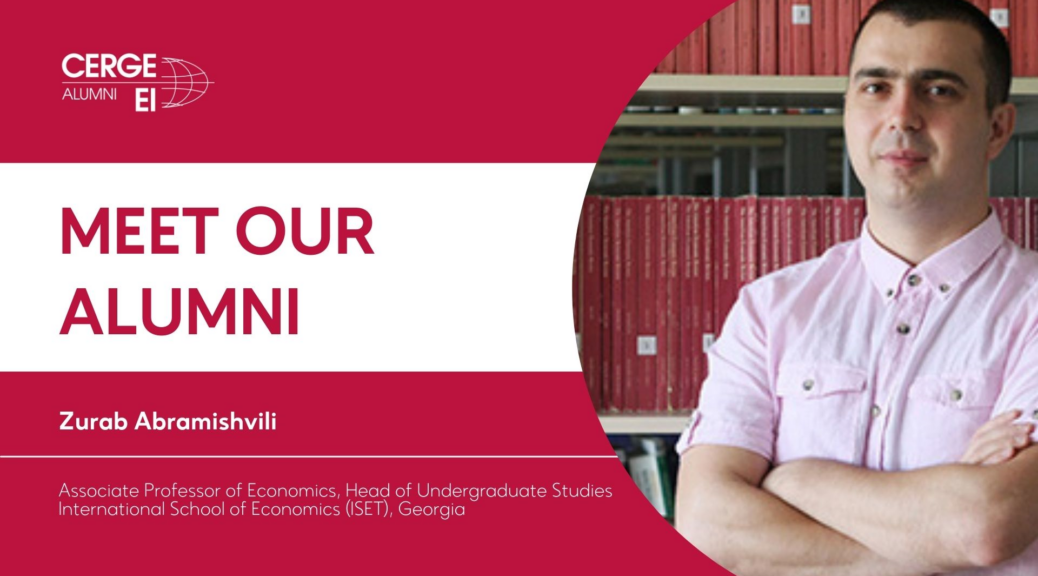Zurab Abramishvili, a PhD graduate from 2017, returned to his home country and became an Associate Professor of Economics and Head of Undergraduate Studies at the International School of Economics (ISET) in Georgia. What does he like about working in academia and what research projects is he currently working on? Find out in our Blog interview.
You studied at ISET prior to coming to CERGE-EI. Why have you decided to apply to CERGE-EI?
After my first year at ISET, I knew that I wanted to continue my studies at the doctorate level. When I started thinking about where to get my PhD, I had three main criteria in mind. Firstly, I wanted to apply to a program that offered excellent research potential, student life, quality of lectures, and learning environment in general. Secondly, I always intended to return to my country and wanted the freedom to work on research projects relevant to my region. Finally, I wanted to conduct research in applied economics and policy impact evaluation.
Furthermore, prior to applying to CERGE-EI, I knew PhD students who were active students. I had met Professor Libor Dusek in Tbilisi when he had a recruitment trip to Georgia. I became acquainted with Randy Filler and got invaluable advice from him, and I also had active interactions with newly appointed CERGE-EI teaching fellows who were pioneers of spreading the word about CERGE-EI. Altogether, these factors determined my decision to apply to CERGE-EI.
After pursuing your PhD you decided to return to your home country. What was the primary motivation behind that?
I wanted to live in my country and build my career here. At the micro level, I had an offer from ISET to join its policy institute and be a visiting lecturer. ISET offered me a platform to grow academically. At the macro level, I wanted to do policy relevant research on Georgia’s economy. Georgia transformed tremendously during 2003-2015. Our government implemented dozens of significant polices, but a majority of them had never been studied by scholars. I wrote all three of my dissertation chapters about Georgian social reforms and have continued doing research regarding such policies in Georgia.
What research projects are you currently working on?
While I am part of several ongoing works, my main research focus has always and continues to be economics of higher education. One of the more dear-to-my-heart projects I’m currently working on with a co-author is using the National Examination and Assessment Center (NAEC) data of university admissions to introduce a quantitative measure of the value added by Georgian universities and create a ranking based on that measure. We will then compare our ranking to the international ranking and provide policy-relevant advice based on the difference.
Since 2017 you are an Associate Professor of Economics and Head of Undergraduate Studies at ISET. Why have you decided on a career in academia? What do you like the most about it?
I joined ISET in 2015 and worked for the policy institute for two years. After two years of active work on research and teaching, I was promoted, officially becoming affiliated with ISET and the head of undergraduate studies. It is worth mentioning that the ISET BA program is the highest rated economics and business program in Georgia.
Academia gives me a high degree of autonomy to work on the projects that interest me most. My time is allocated amongst academic management, research, and teaching. They make up the three most important pillars of academia, and they complement one another, making the job more interesting.
What do you think is the strongest message CERGE-EI gives to its students?
Simple. CERGE-EI emphasizes doing high quality research. They prepare their students to do just that. If you are somebody trying to figure out where to do your PhD and you want to work on the economics of developing countries, to link your future career to your home country, and to have the tools and credentials to do so, then pursue an academic CERGE-EI. I made the right choice and I tell my students to think in a similar way. Based on ISET statistics, I am glad to say that, on average, two students regularly apply to CERGE-EI from ISET annually.
Finally, my advice to future and current CERGE-EI PhD students would be to attend the research seminars that CERGE-EI organizes almost every week. I regret that I did not attend all of them, particularly econometrics series seminars. CERGE-EI is not only a great place to get high-quality economics education, but also an excellent place to do research!
